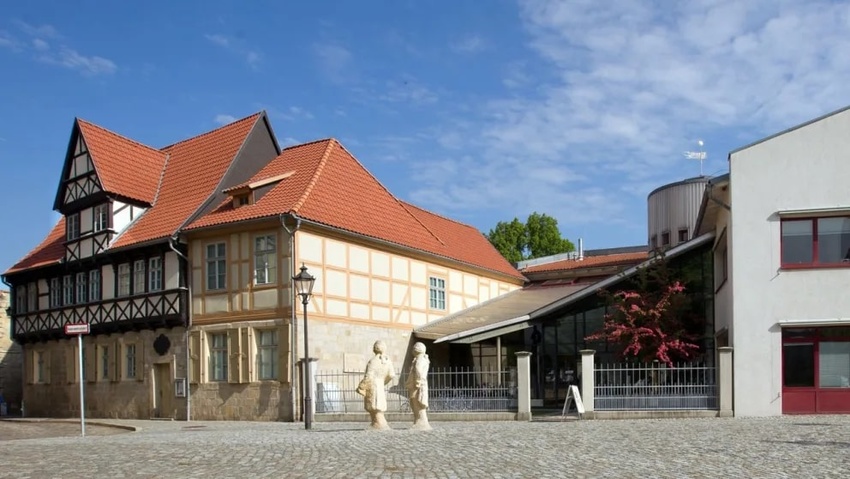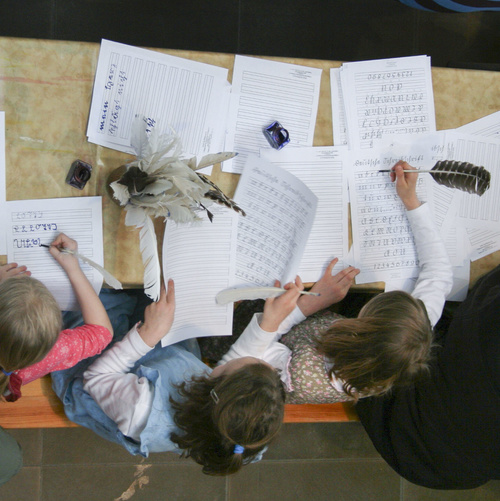
The Gleimhaus literature prizes, both the academic and the student prizes, serve to honour the memory of the Halberstadt poet and Enlightenment figure Johann Wilhelm Ludwig Gleim.
The Gleim Literature Prize was established in 1995 by the Förderkreis Gleimhaus e.V. (support association) in collaboration with the City of Halberstadt, thanks to a private donation. Every two years, it honours German-language research works that make a significant contribution to understanding 18th-century cultural history and are accessible to a wider audience. The prize does not honour an author, but a book that has been published within the five years prior to the award ceremony.
The prize is endowed with 5,000 euros. It is financially supported by the Harzsparkasse Halberstadt, the Kuratorium Stadtkultur Halberstadt (Halberstadt City Culture Board) and the C. H. Beck Foundation Munich.
Jury
Prof. Dr Alexander Košenina, University of Hanover
Dr Angela Steidele, Cologne
Dr Ute Pott, Gleimhaus Halberstadt
Prof. Dr Jürgen Goldstein, University of Koblenz-Landau
Dr Eva Seemann, German Historical Institute Paris (prize winner 2023)
Eva Seemann makes it clear that people of small stature often assumed central functions at German courts in the early modern period up to the 18th century as confidants, advisors and political agents (and not just as entertainers and jokers). This publication brings to light for the first time the full phenomenon, which can be located between the history of absolutism, ceremonial traditions, and the history of art and literature. Eva Seemann presents her research, which is based on an immense study of archives, in a comprehensible, straightforward and clear manner.
Heinrich Detering provides case studies on texts that explore the interactions between plants, animals and humans. He unfolds a panorama of ideas that is fascinating and makes it clear how worthwhile it is to re-read well-known texts, such as those by Goethe (including "Faust"), Lichtenberg and Novalis.
Hagedorn's compellingly told history spans from the 17th to the 18th century and connects to the present day. His work illuminates the wide network of the Bach family before the 'great' Bach, while also documenting the path of the researcher, who has to form his own, verified picture of the past from concrete objective tradition, presumed facts, comparable historical phenomena, clues from other scholars and researchers.
With great narrative talent, Jürgen Goldstein traces the short and extremely eventful life of the writer, translator, explorer, revolutionary and artist Georg Forster (1754-1794). He focuses on Forster's perception of nature and foreign peoples by means of numerous texts.
This book provides an informative and narrative introduction to the life and work of Jean Paul (1765-1825), who was born 250 years ago, experienced years of hardship and eventually became a celebrated author. Jean Paul holds a unique position in the literature of the late 18th and early 19th centuries.
Philipp Blom's book provides a fascinating insight into the intellectual forces in Paris in the second half of the 18th century, into the debates that took place in the salon of Baron Paul Henri Thiry d'Holbach and into the reception of the French Enlightenment to date. Blom presents his portrayal of pre-revolutionary France with expertise and impressive narrative skill.
In this fundamental work on the history of reception and 18th-century research, Mark-Georg Dehrmann reconstructs the reception of the works of the writer and philosopher Anthony Ashley Cooper, the third Earl of Shaftesbury(1671-1713), from the beginnings to Wieland and Herder in a scholarly and linguistically masterful manner.
In this work, which represents a culmination of his engagement with the Enlightenment, Classicism, and Romanticism, Günter de Bruyn presents an insightful and elegantly written cultural portrait of Berlin during the transitional period from the 18th to the 19th century.
In her work on Catharina Margaretha Linck, Angela Steidele uses extensive source research to reconstruct and recount the astonishing life of a woman who lived disguised as a man in the early 18th century and was probably the last woman in Europe to be executed for fornication with another woman in 1721.
In his comprehensive presentation of the Jewish Enlightenment (Haskalah), Christoph Schulte provides an overview of the most important concerns and debates on the Enlightenment in the Jewish minority, introduces the most important representatives with their respective views and arguments and thus presents a multi-layered picture of the motives and goals of the Haskalah.
Martin Geck's study offers a nuanced portrait of the biography and works of the renowned Thomaskantor and municipal music director in Leipzig. His book, which is an exciting read, impresses with its linguistic elegance and its reflective treatment of historical sources, appealing not only to experts but also to music lovers and general readers alike.
In his wide-ranging cultural-historical study, Jürgen Osterhammel analyses the European perception of Asia in the 18th century with the help of numerous sources. Against the backdrop of contemporary globalization discussions, this look back to the "Age of Enlightenment" proves illuminating; Osterhammel uncovers some surprising insights.
Gudrun Gersmann's brilliantly written study examines the extent to which, and the means by which, the literary world of the Ancien Régime actually paved the way for the Revolution. Her work explores, for example, the workings of censorship, the organization of the underground book trade, and the lives of underground authors outside the circles of academies and salons.

Since 1996, the Gleimhaus has awarded the Gleimhaus Literature Prize annually to pupils in grades 5-12/13 in the Harz district. The call for submissions, including the theme, is made in December. The three best works in each of three age groups (grades 5-6, 7-9 and 10-12/13) are honoured. The prize is financed exclusively by donations.
We would like to thank our sponsors: the Kuratorium Stadtkultur; AMEOS Klinikum Halberstadt GmbH and HalberstadtWerke GmbH for their financial support in organising the literature competition.
5th-6th grade
1st place: Nella Böhme, "Die Zeitreiseoma" (The Time Travel Grandma)
2nd place: Martin Gorski, "Zwischenzeit" (In Between Time)
3rd place: Mira Posselt, "Freundschaft für immer" (Friendship Forever)
7th-9th grade
1st place: Ananya Bönisch, "Der Mann vor der Tür" (The Man at the Door)
2nd place: Johanna Schult, "Allein" (Alone)
3rd place: Mara Asemota, "Ein Spaziergang durch die Zeiten" (A Walk Through the Times)
10th-12th grade
1st place: Magdalena Richter, "Zeitvergessen" (Time Forgotten)
2nd place: Renske Fischer, "Zwischen den Zeiten" (Between the Times)
3rd place: Jasmina Hahn, "Zeit vergisst nicht" (Time Does Not Forget)